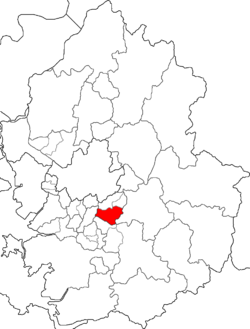Bundang District
|
Bundang-gu 분당구 |
|
|---|---|
| Non-autonomous District | |
| Korean transcription(s) | |
| • Hanja | |
| • Revised Romanization | Bundang-gu |
| • McCune-Reischauer | Pundang-gu |
 |
|
 Map of Gyeonggi highlighting Bundang-gu. |
|
| Country | South Korea |
| Region | Sudogwon (Gijeon) |
| Province | Gyeonggi |
| City | Seongnam |
| Administrative divisions | 19 dong |
| Area | |
| • Total | 69.44 km2 (26.81 sq mi) |
| Population (2007) | |
| • Total | 439,395 |
| • Dialect | Seoul |
| Website | Bundang-gu Office |
Bundang-gu is the largest and most populous district (gu) of Seongnam, a major city in the Seoul Capital Area, South Korea. Bundang is one of South Korea's wealthiest and highest developed areas, being the nation's first and largest completely artificial city built in the early 1990s. Many high-rise luxury condos moved in the early 2000s, with a second planned city built in the late 2000s called Pangyo in the same district. Apartment prices are the second highest in Gyeonggi-do after Gwacheon and 10th highest nationwide, higher than many central Seoul districts such as Mapo-gu or Jongno-gu. Apartments around Pangyo Station and the high-rise luxury condos around Jeongja Station and Sunae Station rival prices in the most expensive areas in the country. Unlike older cities such as Seoul, Bundang has no telephone poles overground, resulting in a clean cityscape with well-designed streets.
Bundang is the headquarters of Korea's leading IT companies such as Naver and KT. Pangyo's Technovalley is home to the country's leading game, entertainment and technology companies such as KakaoTalk, Samsung Techwin, AhnLab, Nexon, NCSOFT,Webzen and Hancom. Due to its close proximity to Seoul's affluent commercial center, Gangnam District, many residents also commute to Gangnam Station via the Shinbundang Line, which takes only 15 minutes from Jeongja Station. The Bundang Line subway connects many of the city's popular commercial areas to southeast Seoul, Yongin and Suwon. The city has a well-developed bus network reaching Seoul's central districts in 30~40 minutes due to being located at an intersection of Gyeongbu Expressway and Seoul Ring Expressway.
...
Wikipedia
